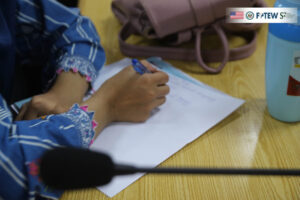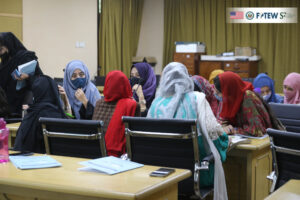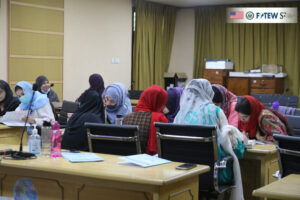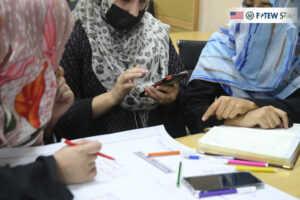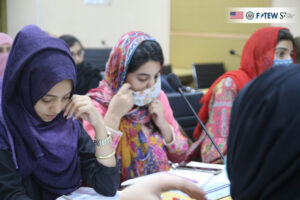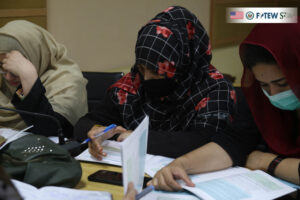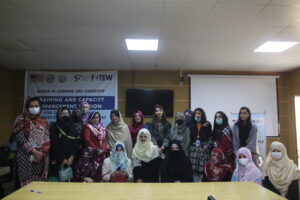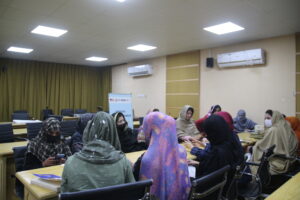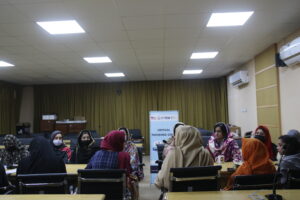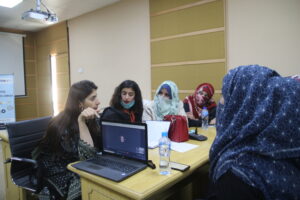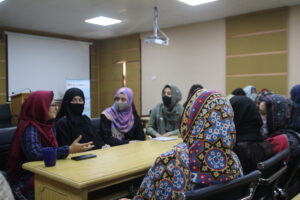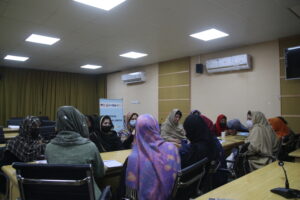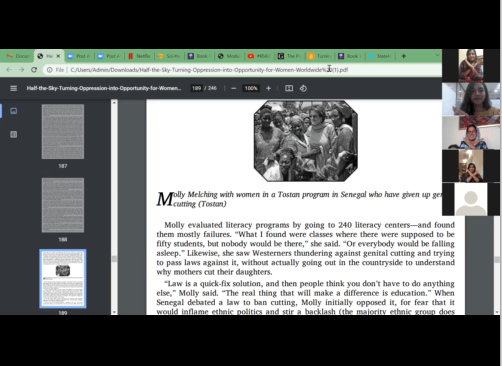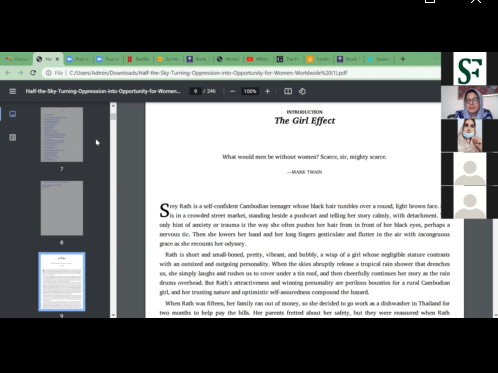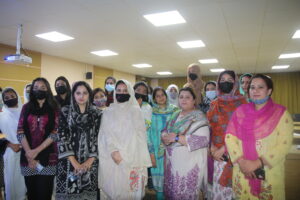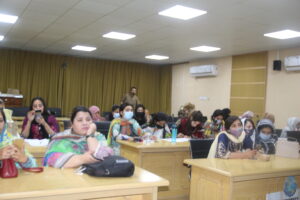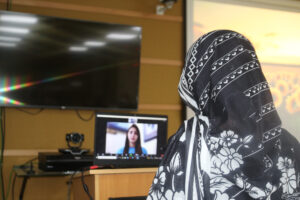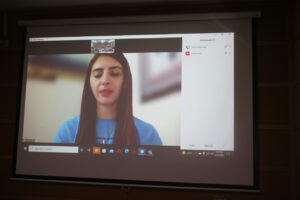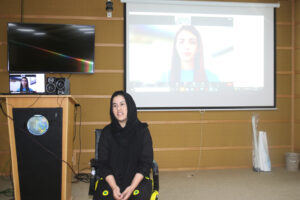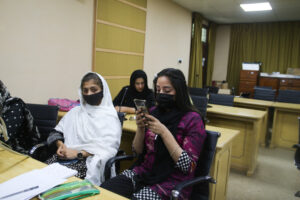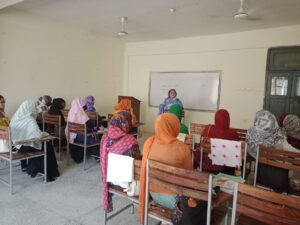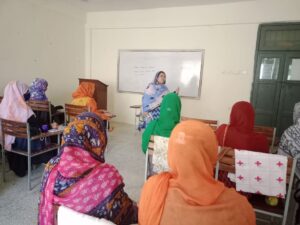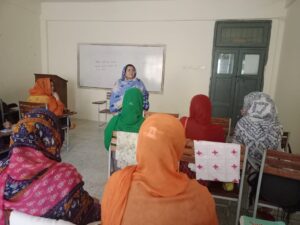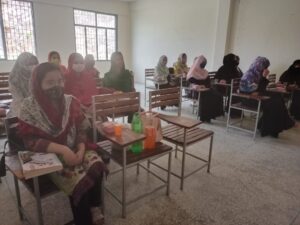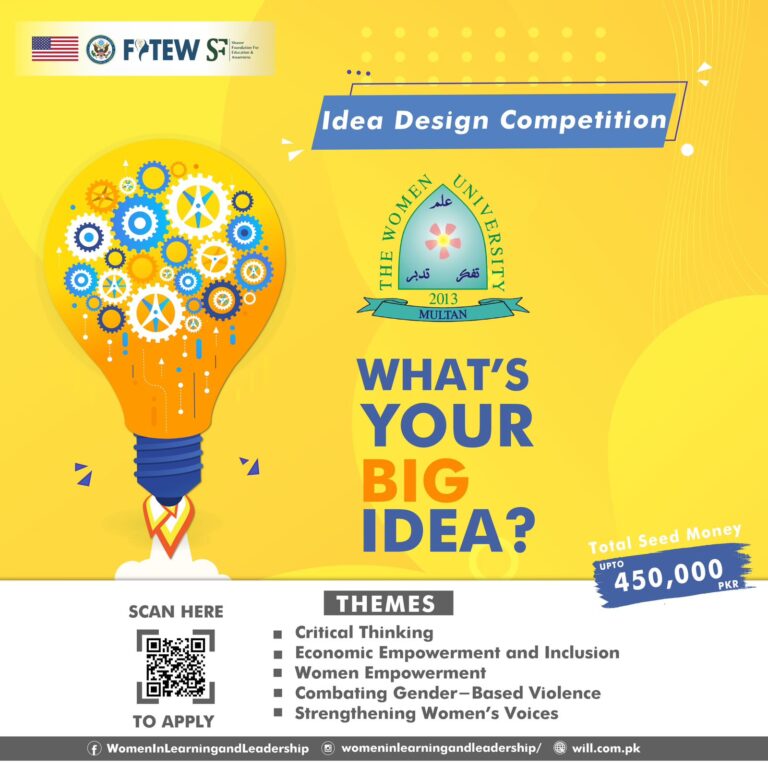Challenges in Girl's education
In connection with International Education Week, a mock Critical Thinking Circle was arranged with students and faculty members of Women University Swabi where ‘Challenges in Girls’ Education’ were discussed on November 22, 2021. Beneficiaries from WILL Training I and II were invited to take part in the discussion moderated by Ms. Sofia Hussain.
The article covered eye-opening facts about Girls’ Education in Pakistan. The participants through the use of critical thinking skills identified the reasons for low literacy and school enrollment rates, gender biases in curriculum and textbooks, and cultural norms affecting girls’ education.
Students engaged in healthy debate to share their perspectives and hear others’ points of view. It provided them the chance for self-expression and participation in intellectual stimulation. The Critical Thinking Circle provided a sense of community where students were given the freedom to be honest without being judged.
Narratives of Confession: Religion and Patriarchy in the Fiction of Shahbaz and Hosseini
A study circle was held at Women University Swabi on December 3, 2021. The paper of Dr. Munazza Yaqoob ‘Narratives of Confession: Religion and Patriarchy in the Fiction of Shahbaz and Hosseini’ was shared with the participants for discussion. The session was attended by around 30 students. Dr. Sonia and Ms. Sofia moderated the session, whereby they engaged students in debate. Dr. Munazza joined the session virtually and explained how an alliance of multiple forms of violence with various structural factors, such as culture, misinterpretation of religion, State policies and law, as well as economic and educational opportunities stem from patriarchy.
The discussion revolved around how violence against women or gender-based violence in society has become a cultural norm because culture operating through the institution of family and misinterpretation of religion establishes women’s dependence on men. Unequal gender relationships are formed when women are refused social mobility and denied entrance to the public sphere. They are made vulnerable and become victims of gender-based violence. Students shared personal stories to add cultural, social, and regional insights to their points of view.
Students and faculty members including HoD English Department, Dr. Humaira Riaz from the City University of Science and IT Peshawar joined the session at Women University Swabi and participated in the discussion. Dr. Humaira Riaz applauded the efforts of the Shaoor Foundation for Education and awareness and wishes to hold Critical Thinking Circle sessions and training at her university for increased academic resources and collaboration for women empowerment.
Half the Sky: Turning Oppression into Opportunity for Women Worldwide
A virtual Critical Thinking Circle session was organized for the students of Women University Multan and Women University Swabi on March 18, 2022, where the book “Half the Sky: Turning Oppression into Opportunity for Women Worldwide” by Nicholas d. Kristof was discussed. The session was moderated by Ms. Sofia Hussain and the duration of the session was 90 minutes. It was attended by 33 students. The discussion revolved around the different stories of women mentioned in the book who were mistreated in many ways across the world, including honor killings, prostitution, childbirth mortality, and unequal access to education and financial success. The women faced adversities and turned their pain into power and uplifted themselves and others around them.
The stories shared to highlight the importance of gender equality in the fight against poverty. The session successfully spread the message among the participants that women and girls hold so much untapped potential to truly transform communities and increase economic prosperity.
During the session, the participants actively participated in the discussion and shared their stories as well. One of the participants, Umama Khakwaani from Women University Multan shared that inspired by the discussion we generated in the critical thinking circles she has started her own food business using Foodpanda and it has been working well.
The session inspired everyone to play their part in whatever way they can to change the world and promote human rights.
The Moment of Lift: How Empowering Women Changes the World
Critical thinking Circle based on the book, “The Moment of Lift: How Empowering Women Changes the World” by Melinda French Gates was held at Women University Swabi on March 31, 2022. Dr. Sonia Irum moderated the session, which had 28 students in attendance. The discussion primarily focused on the author’s encounters with women during her years of travel, humanitarian work, and extensive research. The book introduced the participants to women from all over the world and their brutally honest, gut-wrenching, inspiring, and triumphant stories. The session helped the students understand how empowered women rise up and bring their families and communities with their time and again.
Along with that the writer also shares her own personal journey to achieving equality in her marriage, finding her voice, and becoming an advocate for women and girls. She explains how the women she has met have called her to action. And in her book, she calls us to action too—urging us to drive progress in our homes, workplaces, and communities.
The Critical Thinking Session inspired the students and left them with a sense of hope and determination to empower themselves and others. It also heightened their sense of urgency, convincing them that equality cannot be postponed.
Making Space for Indigenous Feminism
Critical thinking Circle based on the book “Making Space for Indigenous Feminism” was held at Women University Swabi on June 16, 2022. Dr. Samina Gul – HOD/ Assistant Professor Women University Swabi moderated the session, which had 16 students in attendance. This book, written by Indigenous feminists and allies, is a powerful and original intellectual and political contribution that demonstrates that feminism has much to offer Indigenous women and all Indigenous peoples in their struggles against oppression.
The resource person first informed the students about the history of the feminist approach, how it evolved, and what it is. The overview of the book and the author was then discussed, as well as why this book was written, what indigenous feminism means, and how women have been murdered as a result of this concept. Following that, the audience was asked what the key points they learned from the book were. An activity was also conducted about writing and discussing individually with each participant whether they had ever been a victim of any harshness solely because they are females or because they support other females.
The audience then discussed cultural barriers and came up with some solutions with the help of each other, such as how they can break down the barriers to achieve their goals and rights. They also discussed the religious perspective of feminism, emphasizing that it is not harmful to a woman to speak out about her rights.
On the whole, it was a very informative session, and students discovered a forum where they could speak up, open their hearts, discuss their obstacles, and receive advice on how to overcome those issues.
Education, Culture and Critical Thinking
The session on critical thinking at Women University Swabi was fundamentally based on the book by Ken Brown, “Education, Culture and Critical Thinking”. The book discusses the subject of “critical thinking” while deeply emphasizing the culture of rote learning. According to the author, this phenomenon of memorization is widely prevalent in the current education system. He also suggested remedying a widely perceived lack of critical, analytical abilities among school students.
A growing literature on “teaching thinking” and “problem-solving” maintains this commitment, reflecting a common belief that thinking skills of a general nature can not only be identified but can be taught successfully. The paucity of empirical evidence that intellectual skills thus identified actually transfer between domains of thought or subject matters has done little to diminish faith in the possibility that this is achievable. The principal message of this book is that theories of critical thinking which disregard its historical origins and dialectical, traditional character are likely to be seriously flawed. All human societies exhibit problem-solving abilities, often of a high order – all language and thought is fundamentally criteria based. Relevant distinctions between critical thought and its alternative are found in history and culture, in dialogue and criticism, not just in the operations of individual minds.
The session started with a review of the book. The viewpoints of the authors were discussed. Students participated in the activity keenly and shared their insights about the concept of critical thinking in light of the book. Numerous questions were asked regarding the work of Ken Brown while stressing their personal experiences.
Students gauged their education system to cater to the needs of critical thinking. They asserted that the prevalent education system hampers the development of intellectual faculties. Due to the reason education system, particularly in developing countries is unable to produce people with incisive abilities.
It is a common observation in the context of Pakistan that language and culture impede expression. English is considered a standard of intelligence, however, due to multi-linguistic backgrounds people shy away from expressing their thoughts owing to the language barrier. In addition, cultural barriers also impede particularly for females in this vicinity.
